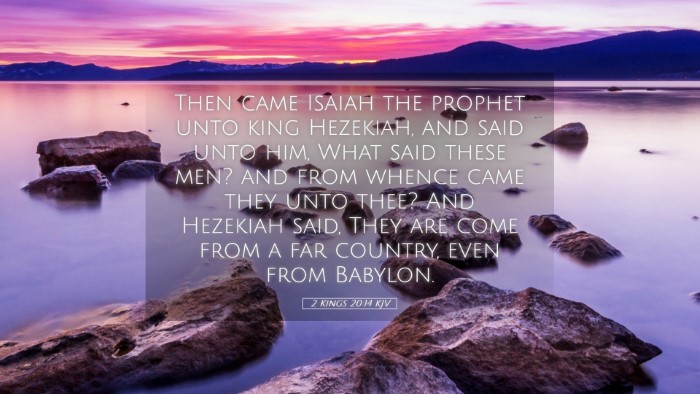Old Testament
Genesis Exodus Leviticus Numbers Deuteronomy Joshua Judges Ruth 1 Samuel 2 Samuel 1 Kings 2 Kings 1 Chronicles 2 Chronicles Ezra Nehemiah Esther Job Psalms Proverbs Ecclesiastes Song of Solomon Isaiah Jeremiah Lamentations Ezekiel Daniel Hosea Joel Amos Obadiah Jonah Micah Nahum Habakkuk Zephaniah Haggai Zechariah Malachi2 Kings 20:14
2 Kings 20:14 KJV
Then came Isaiah the prophet unto king Hezekiah, and said unto him, What said these men? and from whence came they unto thee? And Hezekiah said, They are come from a far country, even from Babylon.
2 Kings 20:14 Bible Commentary
Commentary on 2 Kings 20:14
Verse in Context: The verse reads: "Then came Isaiah the prophet unto King Hezekiah, and said unto him, What said these men? and from whence came they unto thee? And Hezekiah said, They are come from a far country, even from Babylon."
Introduction
This passage from 2 Kings 20:14 presents a pivotal moment in the biblical narrative concerning King Hezekiah of Judah. Not only does it highlight the prophetic ministry of Isaiah, but it also introduces the theme of pride and the implications of human folly in the face of divine sovereignty.
Contextual Overview
The context of this verse is set against the backdrop of Hezekiah’s miraculous healing and the subsequent visit from the Babylonian envoys. Hezekiah had just been granted additional years to his life after crying out to God, and this brings to light both his faith and fragility as a leader.
Analysis of Key Themes
- The Role of the Prophet: Isaiah represents God’s voice, serving as a reminder of the ongoing dialogue between divine authority and human authority. His role is critical in correcting and guiding Hezekiah.
- Judgment and Pride: Hezekiah’s response to the Babylonian emissaries indicates a lapse in judgment. This encounter is a precursor to the eventual Babylonian captivity, highlighting how earthly treasures can lead one astray.
- Revelation of Intent: Isaiah’s probing questions suggest an intention to reveal Hezekiah’s heart and the potential danger of aligning with foreign powers.
Commentary Insights
Matthew Henry's Commentary
Matthew Henry emphasizes the seriousness with which God regards His relationship with His people. He notes that when faced with the question of the Babylonian visitors, Hezekiah should have shown a more godly wisdom rather than pride. Henry asserts that God's blessings, such as healing and deliverance, can often lead to pride if one is not vigilant. He warns of the latent dangers in showing off one’s blessings to the world, suggesting that such actions can provoke divine judgment.
Albert Barnes' Commentary
Albert Barnes provides a historical perspective on this interaction, noting the significance of Babylon as a rising power. He points out that Hezekiah’s show of wealth and power to Babylon carries prophetic weight, directly contributing to the nation’s future. Barnes stresses the importance of humility and the potential consequences of overestimating relationships with secular powers. He interprets this event as part of God's divine plan, reminding readers that God is sovereign even over political alliances.
Adam Clarke's Commentary
Adam Clarke suggests that the inquiry posed by Isaiah serves to expose Hezekiah's heart. Clarke interprets the visit of the Babylonian ambassadors as a test of Hezekiah's faithfulness and reliance on God. He emphasizes that Hezekiah’s display of pride in revealing treasures to the Babylonians mirrors a lack of wisdom which ultimately leads to future consequences for Judah. Clarke’s insight encourages a reflective self-assessment regarding the reliance on God versus the temptation to seek validation through human means.
Theological Reflections
The implications of 2 Kings 20:14 extend into contemporary themes of leadership, humility, and reliance on God. The narrative serves as a cautionary tale about pride and the human tendency to over-rely on external alliances instead of seeking God’s guidance and presence. It beckons modern leaders, especially in faith communities, to consider their own motivations and the potential impacts of their decisions.
Practical Applications
- Humility in Leadership: Leaders should continually reflect on their motivations and the direction in which they lead others, ensuring their actions align with godly principles rather than personal ambition.
- Engagement with the World: While engagement with external entities can be beneficial, it is crucial to maintain a clear priority on spiritual integrity and divine guidance.
- Accountability to God: Just as Hezekiah was accountable for his display of riches to Babylon, today’s leaders must recognize their accountability to God in their actions and decisions.
Conclusion
2 Kings 20:14 is a reminder of the eternal principles of divine sovereignty, the dangers of pride, and the need for humility in leadership. As pastors, students, and theologians reflect on this text, they are encouraged to seek wisdom and guidance from God, to remain vigilant against the pride that can stem from success, and to foster relationships that reflect godly values.


